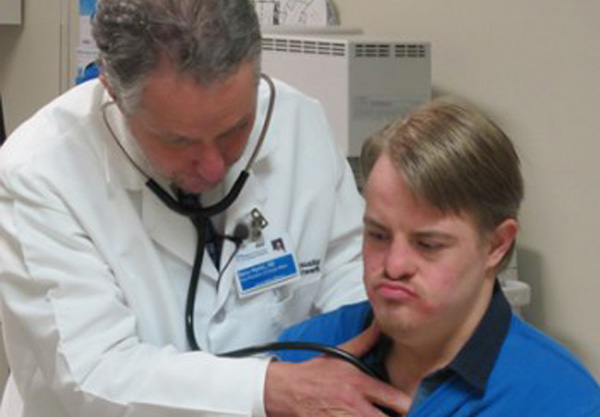As we delve into the complex realm of genetics and neurological disorders, a striking correlation emerges: women with Down syndrome are at an increased risk of developing Alzheimer's disease. This connection is both fascinating and alarming, warranting a closer examination of the underlying mechanisms and implications for the health and wellbeing of these individuals.
The Prevalence of Down Syndrome and Alzheimer's Disease
Down syndrome, a genetic disorder caused by the presence of an extra copy of chromosome 21, affects approximately 1 in every 700 births in the United States. While the syndrome is characterized by intellectual disabilities and physical abnormalities, it is also associated with a higher risk of developing certain health conditions, including Alzheimer's disease. Alzheimer's, a progressive neurological disorder, is the most common cause of dementia, accounting for 60-80% of dementia cases worldwide.The Link Between Down Syndrome and Alzheimer's Disease in Women
Research has consistently shown that women with Down syndrome are more likely to develop Alzheimer's disease than the general population. In fact, studies suggest that:- Women with Down syndrome are 10-20 times more likely to develop Alzheimer's disease than the general population.
- The risk of Alzheimer's disease increases with age, with women over 40 being more susceptible.
- The presence of the APP (amyloid precursor protein) gene on chromosome 21, which is also associated with Alzheimer's disease, may contribute to this increased risk.
Implications for Health and Wellbeing
The correlation between Down syndrome and Alzheimer's disease in women has significant implications for their health and wellbeing. Women with Down syndrome are already faced with unique challenges, including intellectual disabilities and physical health issues. The added risk of Alzheimer's disease can further compromise their quality of life, making it essential to:- Implement early screening and diagnostic measures to identify Alzheimer's disease in its early stages.
- Develop targeted interventions and support services to address the complex needs of women with Down syndrome and Alzheimer's disease.
- Conduct further research to unravel the underlying mechanisms driving this connection, with the ultimate goal of developing effective prevention and treatment strategies.

The Genetics Behind the Link
Chromosome 21 and the Increased Risk of Alzheimer's
Individuals with Down syndrome have a unique genetic profile, with an extra copy of chromosome 21. This extra genetic material leads to an increased risk of developing Alzheimer's disease, with studies suggesting that nearly 75% of people with Down syndrome will develop Alzheimer's by the age of 65. But why does this extra chromosome increase the risk of Alzheimer's? The answer lies in the genes present on chromosome 21. One of the key genes located on this chromosome is the APP gene, which codes for the amyloid precursor protein. This protein is critical in the development of Alzheimer's disease, as it can break down into smaller peptides that form the hallmark amyloid plaques seen in the brains of individuals with Alzheimer's.The Role of the APP Gene in Alzheimer's Development
The APP gene plays a central role in the development of Alzheimer's disease. In individuals with Down syndrome, the extra copy of chromosome 21 leads to an overproduction of the APP protein. This excess protein can then break down into the toxic peptides that contribute to the formation of amyloid plaques.- Research has shown that the APP protein is processed differently in individuals with Down syndrome, leading to an increased production of the toxic Aβ peptide.
- This peptide is the primary component of the amyloid plaques seen in Alzheimer's disease, and its accumulation is thought to contribute to the cognitive decline and memory loss characteristic of the condition.
- The overexpression of the APP gene in individuals with Down syndrome increases the risk of Alzheimer's disease by promoting the formation of these toxic plaques.

The Increased Risk of Alzheimer's in Women with Down Syndrome
Statistics: A Higher Risk for Those with Down Syndrome
Individuals with Down syndrome are at a higher risk of developing Alzheimer's disease compared to the general population. According to the National Down Syndrome Society, approximately 1 in 3 people with Down syndrome will develop Alzheimer's disease. This increased risk is attributed to the genetic makeup of individuals with Down syndrome, who have an extra copy of chromosome 21. This extra genetic material leads to the overproduction of a protein called amyloid precursor protein, which is a hallmark of Alzheimer's disease.Women with Down Syndrome: A Higher Risk Subgroup
Research has shown that women with Down syndrome are more likely to develop Alzheimer's disease than men with the condition. A study published in the Journal of Alzheimer's Disease found that women with Down syndrome were 1.5 times more likely to develop Alzheimer's than men with the condition. This disparity is not unique to individuals with Down syndrome, as women in the general population are also more likely to develop Alzheimer's than men. However, the reasons behind this disparity are not yet fully understood.Potential Reasons Behind the Disparity
Several factors may contribute to the increased risk of Alzheimer's disease in women with Down syndrome. Some possible reasons include:- Hormonal differences: Women with Down syndrome, like women in the general population, experience a decline in estrogen levels during menopause. This decline may contribute to an increased risk of Alzheimer's disease.
- Lifetime estrogen exposure: Women with Down syndrome may have a longer lifetime exposure to estrogen, which could contribute to an increased risk of Alzheimer's.
- Differences in brain structure: Research has shown that women with Down syndrome may have differences in brain structure compared to men with the condition, which could affect their risk of developing Alzheimer's.
- : Genetic factors may also play a role in the increased risk of Alzheimer's in women with Down syndrome. For example, certain genetic variants may be more common in women with the condition.
Implications and Future Directions
The increased risk of Alzheimer's disease in women with Down syndrome has significant implications for their care and management. Healthcare providers should be aware of this increased risk and monitor women with Down syndrome closely for signs of cognitive decline. Furthermore, researchers should continue to explore the reasons behind this disparity, with the goal of developing targeted interventions to reduce the risk of Alzheimer's in this vulnerable population. In conclusion, the increased risk of Alzheimer's disease in women with Down syndrome is a pressing concern that requires further research and attention. By understanding the reasons behind this disparity, we can work towards developing more effective strategies for preventing and treating Alzheimer's in this high-risk group.
The Importance of Early Diagnosis and Intervention
Diagnosing Alzheimer's in Individuals with Down Syndrome: The Challenges
Individuals with Down syndrome are at a higher risk of developing Alzheimer's disease, with studies suggesting that up to 70% of people with Down syndrome will develop Alzheimer's in their lifetime. However, diagnosing Alzheimer's in individuals with Down syndrome can be challenging due to various reasons. One of the main challenges is that people with Down syndrome often experience cognitive decline as part of their natural aging process, making it difficult to distinguish between age-related cognitive changes and Alzheimer's disease. Additionally, individuals with Down syndrome may have pre-existing intellectual disabilities, which can make it harder to assess cognitive function and identify signs of Alzheimer's. Furthermore, the symptoms of Alzheimer's in individuals with Down syndrome may differ from those experienced by the general population. For instance, individuals with Down syndrome may exhibit changes in behavior, such as increased anxiety or agitation, rather than memory loss or cognitive decline. Early Intervention and Treatment: The Benefits Despite the challenges, early diagnosis and intervention are crucial in managing Alzheimer's disease in individuals with Down syndrome. Early intervention can help to:- Slow down the progression of the disease
- Improve cognitive function and memory
- Enhance quality of life
- Support independence and daily living skills
- Reduce the risk of behavioral problems and other related issues
The Role of Caregivers and Healthcare Professionals
Caregivers and healthcare professionals play a vital role in supporting individuals with Down syndrome and Alzheimer's disease. They can:- Provide emotional support and reassurance
- Develop personalized care plans that cater to the individual's unique needs
- Monitor cognitive function and behavior, identifying early signs of decline
- Implement evidence-based interventions and therapies
- Facilitate access to specialized services and resources

Breaking Down Barriers: Improving Healthcare for Women with Down Syndrome
The Need for Increased Awareness and Education
Women with Down syndrome face unique challenges when it comes to accessing quality healthcare. One of the primary barriers to overcome is the lack of awareness and education among healthcare professionals. Many healthcare providers may not have received sufficient training on caring for individuals with intellectual and developmental disabilities, leading to misunderstandings and misdiagnoses. This knowledge gap can result in delayed or inadequate treatment, further exacerbating health disparities. Inclusive Healthcare Services: A Necessity Inclusive and accessible healthcare services are essential for women with Down syndrome to receive the care they need. This includes:- Trained healthcare professionals who understand the specific needs and challenges of individuals with Down syndrome.
- Accessible medical equipment and facilities that can accommodate individuals with physical disabilities.
- Culturally sensitive care that acknowledges and respects the individual's autonomy and decision-making capacity.
- Language access services to ensure effective communication with healthcare providers.
The Power of Advocacy Groups
Advocacy groups play a vital role in promoting the rights and needs of individuals with Down syndrome. These organizations work tirelessly to:- Raise awareness about the healthcare disparities faced by individuals with Down syndrome.
- Advocate for policy changes that promote inclusive and accessible healthcare services.
- Provide education and training for healthcare professionals to improve their understanding of Down syndrome.
- Support individuals with Down syndrome and their families by providing resources and connections to healthcare services.

Frequently Asked Questions (FAQ)
What are the early signs of Alzheimer's disease in people with Down syndrome?
Early detection of Alzheimer's disease in individuals with Down syndrome can significantly impact the quality of life and care for these individuals. It is essential to recognize the subtle changes in behavior, memory, and cognitive function that may indicate the onset of Alzheimer's disease. Subtle Changes in Behavior People with Down syndrome may exhibit changes in behavior that can be easily overlooked or misattributed to their existing cognitive impairments. However, these changes can be indicative of the onset of Alzheimer's disease. Some common behavioral changes to look out for include:
- Increased anxiety or agitation in response to ordinary situations
- Mood swings or emotional reactivity, such as sudden outbursts or becoming easily upset
- Changes in sleep patterns, such as insomnia or excessive daytime sleepiness
- Loss of interest in activities that were previously enjoyed
- Withdrawal from social interactions or becoming more isolated
- Difficulty remembering recent events or learning new information
- Forgetting familiar words, names, or faces
- Struggling to follow instructions or complete tasks
- Difficulty with problem-solving or making decisions
- Repeating questions or statements
- Language skills, such as difficulty with word-finding or sentence construction
- Visuospatial skills, such as trouble with navigation or recognizing objects
- Executive function, including difficulties with planning, organization, and time management
- Difficulty with daily living activities, such as dressing, grooming, or using the bathroom
- Decreased coordination or balance, leading to falls or stumbling
- Changes in appetite or eating habits
- Increased reliance on caregivers or assistance with daily tasks
Can Alzheimer's disease be prevented or cured in people with Down syndrome?
Understanding the Complex Relationship between Down Syndrome and Alzheimer's Disease People with Down syndrome are at a higher risk of developing Alzheimer's disease, a progressive neurological disorder characterized by memory loss, cognitive decline, and personality changes. In fact, research suggests that individuals with Down syndrome are 3-5 times more likely to develop Alzheimer's disease than the general population. This increased risk is attributed to the genetic makeup of Down syndrome, which involves an extra copy of chromosome 21. The amyloid precursor protein (APP) gene, located on chromosome 21, plays a crucial role in the development of Alzheimer's disease. The extra copy of this gene leads to an overproduction of amyloid-β, a protein that accumulates in the brain and is a hallmark of Alzheimer's disease. Current State of Research: Prevention and Treatment Options Researchers are actively exploring ways to prevent or cure Alzheimer's disease in people with Down syndrome. While there is no definitive cure yet, several promising areas of research offer hope for the future: ### Early Intervention and Lifestyle Changes Studies suggest that early intervention and lifestyle changes may help prevent or delay the onset of Alzheimer's disease in people with Down syndrome. These interventions include:
- Cognitive training: Engaging in cognitive exercises and activities that challenge the brain may help build cognitive reserve, reducing the risk of cognitive decline.
- Physical exercise: Regular physical activity has been shown to improve cognitive function and reduce the risk of Alzheimer's disease.
- Social engagement: Maintaining social connections and participating in social activities may help reduce the risk of cognitive decline.
- Healthy diet: A diet rich in fruits, vegetables, and omega-3 fatty acids, such as the Mediterranean diet, may help reduce the risk of Alzheimer's disease.
- Donepezil: A cholinesterase inhibitor, which has been shown to improve cognitive function in people with Alzheimer's disease.
- Memantine: An N-methyl-D-aspartate (NMDA) receptor antagonist, which may help slow down cognitive decline.
- Gamma-secretase inhibitors: These agents target the APP gene, reducing the production of amyloid-β and potentially preventing Alzheimer's disease.
- Gene editing: Techniques like CRISPR-Cas9 may allow for the correction of the APP gene, reducing the risk of Alzheimer's disease.
- Stem cell therapy: Stem cells may be used to replace damaged brain cells, potentially reversing cognitive decline.
How can caregivers and family members support a loved one with Down syndrome and Alzheimer's disease?
Supporting a loved one with Down syndrome and Alzheimer's disease requires a comprehensive approach that addresses their emotional, physical, and psychological needs. As a caregiver or family member, you play a vital role in ensuring their well-being and quality of life. Here are some practical advice and strategies to help you provide the necessary support: ### Emotional Support Individuals with Down syndrome and Alzheimer's disease often experience a range of emotions, including anxiety, frustration, and sadness. It's essential to provide emotional support to help them cope with these feelings. Here are some ways to offer emotional support:
- Validate their feelings: Acknowledge and accept their emotions, even if you don't understand their perspective. Validation helps individuals feel heard and understood, reducing feelings of anxiety and frustration.
- Encourage communication: Create a safe and non-judgmental space for them to express their feelings and concerns. Use simple and clear language to facilitate communication.
- Offer reassurance: Provide physical comfort, such as hugs or handholding, to reassure them of your presence and support.
- Assist with daily routines: Help them with daily tasks, such as bathing, dressing, and grooming. Break down complex tasks into simpler steps to promote independence.
- Encourage physical activity: Support them in engaging in physical activities, such as walking, stretching, or exercises, to maintain their physical health and mobility.
- Manage safety risks: Identify potential safety risks, such as falls or wandering, and take measures to mitigate them, such as installing handrails or using GPS tracking devices.
Cognitive Support
- Use memory aids: Utilize memory aids, such as calendars, reminders, and memory books, to help them remember important dates, events, and tasks.
- Encourage mental stimulation: Engage them in mentally stimulating activities, such as puzzles, games, or arts and crafts, to promote cognitive function.
Behavioral Support
- Identify triggers: Identify triggers that may contribute to behavioral changes, such as anxiety or frustration, and develop strategies to manage them.
- Use positive reinforcement: Use positive reinforcement techniques, such as praise or rewards, to encourage desired behaviors and reduce challenging ones.
- Seek professional help: Consult with healthcare professionals, such as geriatricians, psychologists, or occupational therapists, to develop a comprehensive care plan.
- Build a support network: Connect with other caregivers, support groups, and online resources to build a network of support and reduce feelings of isolation.
- Prioritize self-care: Don't forget to prioritize your own physical, emotional, and psychological well-being to avoid burnout and maintain your ability to provide care.

